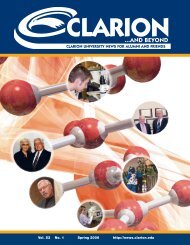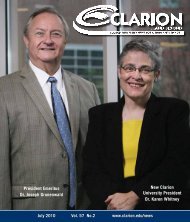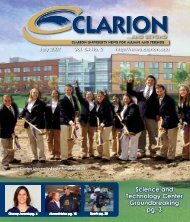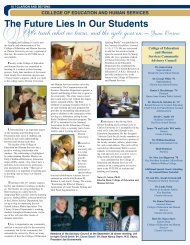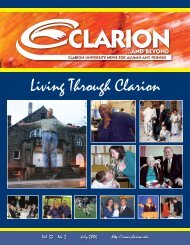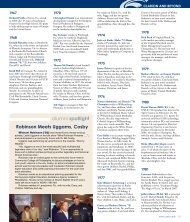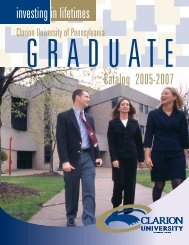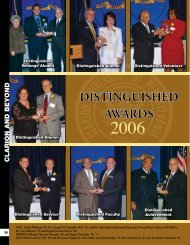<strong>Clarion</strong> <strong>University</strong> of Pennsylvania 79CurriculumCourse Sequence: Nurse Educator ConcentrationFull-TimeFall-Year 1 Spring-Year 1 Summer-Year 1615/616 Adv. Health Assessment 610 Adv. Con. in Research 800 Thesis/Project601 Adv. Con. Pathophysiology 602 Pharmacologic App605 Evol. of Nursing TheoryFall-Year 2 Spring-Year 2 Summer-Year 2675 Nurs. Curriculum Development 645 Nursing & Public Policy 750 Internship676 Educational Strategies in Nursing 677 Eval. and Assessment in614 Health Promotion: Family Nursingand Community PerspectivesNursingPart-TimeFall-Year 1 Spring-Year 1 Summer-Year 1614 Health Promotion: Family 602 Pharmacologic Appand Community Perspectives601 Adv. Con. PathophysiologyFall-Year 2 Spring-Year 2 Summer-Year 2615/616 Adv. Health Assessment 610 Adv. Con. in Research 800 Thesis/Project605 Evol. of Nursing Theory 645 Nursing & Public PolicyFall-Year 3 Spring-Year 3 Summer-Year 3675 Nurs. Curriculum Development 677 Eval. and Assessment in 750 Internship676 Educational Strategies in Nursing NursingNursing CoursesNURS 601: Advanced Concepts in Pathophysiology 3 s.h.This course is devoted to the study of the physiological process of disease and the body’s response to this process. It isthe goal of the course to present broad physiological principles that nurse practitioners can apply to their clinical experiences.Specific diseases are used to exemplify pathophysiological concepts, and treatment is examined at the molecular level asresponse to the pathophysiology. The course investigates exogenous causes of diseases emphasizing infection, inflammation,and the immune response as well as endogenous diseases of the nervous, endocrine, cardiovascular, hepatic, pulmonary, andrenal systems. Fall, annually.NURS 602: Pharmacologic Applications 3 s.h.This course will cover principles of pharmacology as applied to advanced nursing practice. This includes drug effectiveness,mechanism, and interaction. Emphasis will be on the pharmacological action of drugs on specific organ systems and theclinical use of drugs in treatment of disease conditions. Emphasis will be on critical decision making skills in the selectionof drug therapy, doses of drugs, routes of administration and preferred therapy. This course focuses on pharmacological implicationsfor the family nurse practitioner in working with individuals across the life span. Prerequisite: NURS 601. Spring,annually and as needed.NURS 605: Evolution of Nursing Theory 3 s.h.This course focuses on selected aspects of theory development in nursing science. Emphasis is given to the study ofepistemological issues related to the evolution of theory in nursing. Varying levels and components of theories are explored.Major strategies for theory development, including concept analysis, synthesis, and theory derivation are analyzed. Studentsgain experience in critically examining major existing theoretical models. Fall, annually.NURS 610: Advanced Concepts in Nursing Research 3 s.h.This course examines the relationship and contribution of nursing research to the development of nursing science. Thegrowth of research will be traced over the course of the last century, with particular emphasis on the evolution that has occurredsince mid-century. Students will be assisted to increase their ability to critically evaluate published research and tomake decisions concerning its applicability to practice. Additionally, students will develop a proposal for an individual orgroup research project which may become the foundational work for the scholarly project/thesis. Prerequisite: NURS 605 orby permission of instructor. Spring, annually and as needed.NURS 614: Health Promotion: Family and Community Perspectives 3 s.h.This course introduces the advanced practice nurse student to health promotion and disease prevention strategies for familiesand communities. Students will explore principles of family theory, established models of family development, epidemiology,and demography. An opportunity will be given to develop intervention plans to improve wellness based on risk assessmentand knowledge of national standards of clinical preventive services. The course is a prerequisite to all clinical nursing courses,but must be taken concurrently with NURS 620. Fall, annually.
80 <strong>Clarion</strong> <strong>University</strong> of PennsylvaniaNursingNURS 615: Advanced Health Assessment 2 s.h.This course builds upon the basic assessment skills of the nurse. It is designed to augment, refine, and enhance thepractitioner’s ability to assess the health status of individuals, to recognize deviant and abnormal findings, to evaluate responsesto illness, and to identify health risks. The course enables the practitioner to collect a comprehensive health historyand perform a complete physical assessment in a systematic and organized manner. Course content emphasizes a holisticapproach toward assessment, incorporating the client’s response to wellness and illness, sociocultural influences, and healthseeking behaviors. Specialized assessment tests and procedures and laboratory test data are used by the practitioner to uncoverclient health cues in addition to those identified by questioning and examining. The practitioner’s skill in assessing a client’sresources, strengths, limitations, and coping behaviors are intensified. Two lecture hours weekly. Prerequisite or co-requisite:NURS 601. Fall, annually and as needed.NURS 616: Advanced Health Assessment Practicum 1 s.h.Provides opportunity for the student to implement the objectives identified in NURS 615. Students may select experiencesfrom a variety of clinical settings appropriate to the course focus. Three clinical hours weekly. The course must be taken asa co-requisite to NURS 615. Prerequisite or co-requisite: NURS 601. Fall, annually and as needed.NURS 620: Clinical Decision Making I 2 s.h.This course emphasizes clinical data-gathering skills, diagnostic reasoning, and clinical problem-solving for applicationin NURS 630 and NURS 640 directed toward the management of health problems of clients throughout the lifespan. Criticalthinking skills are emphasized and honed and are used to amplify common sense, intuition, and simple reasoning. Emphasisis placed upon the analysis and synthesis of client data for diagnosis and for identification of appropriate nursing and othertherapeutic interventions to be used by the advanced practice nurse. Two lecture hours weekly. The course must be takenconcurrently with NURS 621. The course is required as a prerequisite to all other clinical nursing courses. Prerequisite: NURS615 and NURS 616. Spring, annually and as needed.NURS 621: Clinical Decision Making I Practicum 1 s.h.Provides opportunity for the student to implement the objectives identified in NURS 620. Students may select experiencesfrom a variety of clinical settings appropriate to the course focus. Three clinical hours weekly. This course must be takenconcurrently with NURS 620. Prerequisite: NURS 615. Spring, annually and as needed.NURS 630: Clinical Decision Making II 3 s.h.This course focuses upon birth through adolescence in regard to health promotion, wellness maintenance, disease prevention,early detection of problems, prompt treatment of acute illness, and support for management and self care during chronicconditions. All dimensions of development and the total health of the child and family are considered. Course theory seeksto expand the practitioner’s base of knowledge and understanding while clinical practicum provides an opportunity for theapplication of learning and the enhancement of decision-making skills. Opportunity is provided for the development of skillin selected therapeutic interventions related to health care of the client from birth through adolescence. The course providesfor expansion of knowledge for application in working with clients, families, and colleagues in clinical practice. Collaborationwith other health care providers is fostered. Three lecture hours weekly. The course must be taken concurrently with NURS631 and NURS 632. Prerequisites: Minimum grade of “B” in NURS 614, 615, and 620. Fall, annually.NURS 631: Clinical Decision Making II: Role Seminar 1 s.h.The seminar, a controlled environment for deliberation on clinical situations encountered, explores the role of the practitionerin advanced nursing practice. It provides opportunities for discussion of alternative approaches to diagnosis, advancednursing, medical, or collaborative management. The seminar will include the discussion of clinical based research questions,client presentations, and effective treatment interventions. Two laboratory hours weekly. The course must be taken concurrentlywith NURS 630 and 632. Prerequisites: Minimum grade of “B” in NURS 614, 615, and 620. Fall, annually.NURS 632: Clinical Decision Making II Practicum 2 s.h.Provides opportunity for the student to implement the objectives identified in NURS 630. Students may select experiencesfrom a variety of clinical settings appropriate to the course focus. Six clinical hours weekly. The course must be takenconcurrently with NURS 630 and 631. Prerequisite: Minimum grade of “B” in NURS 614, 615 and 620. Fall, annually.NURS 640: Clinical Decision Making III 3 s.h.This course focuses upon adults (young, middle-aged, and older) in regard to health promotion, wellness maintenance,disease prevention, early detection of problems, prompt treatment of acute illness, and support for management and selfcare during chronic conditions. All dimensions of development and the total health of the adult and family are considered.Course theory seeks to expand the practitioner’s base of knowledge and understanding while clinical practicum provides anopportunity for the application of learning and the enhancement of decision-making skills. Opportunity is provided for thedevelopment of skill in selected therapeutic interventions related to health care of the adult. The course provides for expansionof knowledge for application in working with clients, families, and colleagues in clinical practice. Collaboration withother health care providers is fostered with emphasis upon the coordination and continuity of client care. Three lecture hoursweekly. The course must be taken concurrently with NURS 641 and 642. Prerequisites: Minimum grade of “B” in NURS614, 615, and 620. Spring, annually.NURS 641: Clinical Decision Making III: Role Seminar 1 s.h.This seminar, a controlled environment for deliberation on clinical situations encountered, explores the role of the practitionerin advanced nursing practice. It provides opportunities for discussion of alternative approaches to diagnosis, advancednursing, medical, or collaborative management. The seminar will include the discussion of clinical based research questions,client presentations, and effective treatment interventions. Two laboratory hours weekly. The course must be taken concurrentlywith NURS 640 and 642. Prerequisites: Minimum grade of “B” in NURS 614, 615, and 620. Spring, annually.



